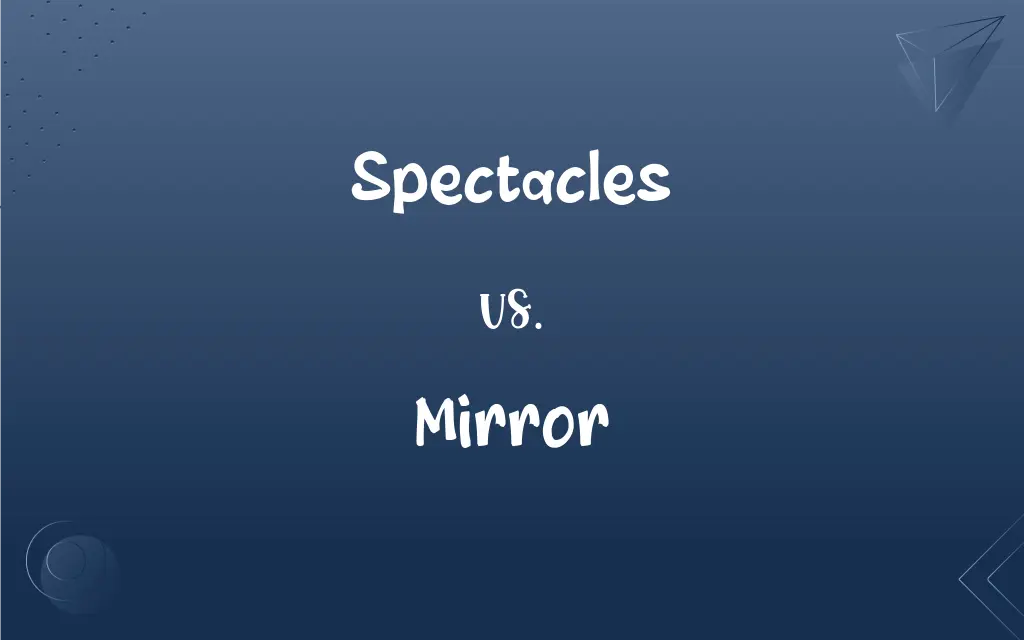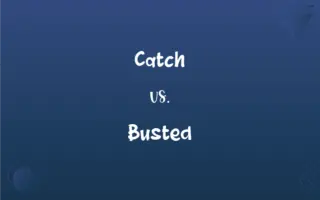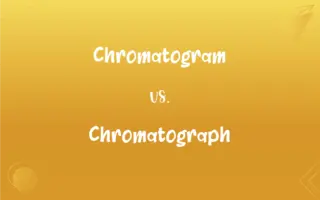Spectacles vs. Mirror: What's the Difference?
Edited by Harlon Moss || By Janet White || Updated on September 28, 2023
Spectacles are frames bearing lenses worn to correct vision, while a mirror is a reflective surface, typically of glass coated with a metal amalgam, which reflects a clear image.

Key Differences
Spectacles and mirror, although both associated with seeing, serve distinctly different purposes and are fundamentally different in construction and utility. Spectacles are a pair of lenses set in a frame worn on the nose to correct defects in sight. They are essential for individuals with vision impairments, allowing them to see the world clearly and navigate through their daily lives. On the other hand, a mirror is a surface capable of reflecting sufficient undiffused light to form an image of an object placed in front of it. It does not alter the viewer’s sight but presents a reflection of the viewer and their surroundings.
The use of spectacles primarily revolves around rectifying vision deficiencies such as myopia or hypermetropia. They are personal, usually tailored to the individual’s specific needs and are intended to be worn consistently to aid vision. Conversely, the mirror serves to reflect light and form images of objects, playing an indispensable role in personal grooming, decoration, and various technological applications. The mirror, unlike spectacles, is not worn or carried but is usually affixed to a wall or a stand.
Examining spectacles, their importance is underscored in their ability to correct vision, enabling individuals to read, work, and perform everyday activities with ease. Spectacles can be equipped with lenses that have various modifications, such as anti-glare, tinted, or photochromic, to suit individual preferences and needs. In contrast, the significance of a mirror is manifold; it’s not only pivotal in personal grooming and decoration but also in scientific and technological apparatuses, like telescopes and periscopes, where it aids in forming and directing light and images.
Diving further, spectacles, which are intimately connected to an individual, are an accessory that can be both functional and stylish, and may be chosen to reflect personal style. They are pivotal for those with impaired vision and are often an everyday necessity. The mirror, being a reflective surface, does not have a personal connection to an individual and is not carried around as a personal item. It is universally used and is indispensable in households, vehicles, and various equipment.
In essence, while spectacles and mirrors both relate to vision and perception, they differ greatly in function, application, and personal connection. Spectacles are indispensable for those with vision impairments and serve as a personal accessory, while mirrors are universally reflective, providing clear images and serving varied uses in different fields.
ADVERTISEMENT
Comparison Chart
Definition
Frames bearing lenses worn to correct vision.
Reflective surface that reflects a clear image.
Use
Correcting vision impairments.
Reflecting images, personal grooming, and various applications
Personal Connection
Personal and usually tailored to individual needs.
Universally used, not personal or carried around.
Functionality
Can be both functional and a fashion accessory.
Primarily functional but can also serve as decoration.
Nature
Portable and worn on the face.
Usually fixed to a wall or a stand.
ADVERTISEMENT
Spectacles and Mirror Definitions
Spectacles
A device worn to assist in viewing or observing.
He uses special spectacles when observing the stars.
Mirror
A reflective surface that reflects a clear image.
She looked in the mirror to apply her makeup.
Spectacles
A frame bearing lenses for correcting defective vision.
After her eye exam, she received a new prescription for her spectacles.
Mirror
A glass surface backed with a reflective coating to form images.
The antique mirror had lost some of its reflective coating.
Spectacles
A pair of lenses set in a frame to aid defective eyesight.
He misplaced his spectacles and couldn’t read the menu.
Mirror
A piece of glass that reflects images.
The broken mirror scattered pieces of reflective glass everywhere.
Spectacles
An optical instrument to correct vision impairments.
Her spectacles are specifically designed to block blue light.
Mirror
An object that reflects light to form images of objects placed before it.
The scientist used a mirror to focus light in the experiment.
Spectacles
Glasses that are worn to help a person see better.
He always keeps his spectacles in a protective case when not in use.
Mirror
A polished or smooth surface capable of reflecting sufficient undiffused light.
The calm lake was like a mirror, reflecting the mountains beautifully.
Spectacles
Something that can be seen or viewed, especially something of a remarkable or impressive nature.
Mirror
A surface capable of reflecting sufficient undiffused light to form an image of an object placed in front of it. Also called looking glass.
Spectacles
A public performance or display, especially one on a large or lavish scale.
Mirror
Something that faithfully reflects or gives a true picture of something else.
Spectacles
A regrettable public display, as of bad behavior
Drank too much and made a spectacle of himself.
Mirror
Something worthy of imitation.
Spectacles
A pair of eyeglasses.
Mirror
To reflect in or as if in a mirror
"The city mirrors many of the greatest moments of Western culture" (Olivier Bernier).
Spectacles
Something resembling eyeglasses in shape or suggesting them in function.
Mirror
A smooth surface, usually made of glass with reflective material painted on the underside, that reflects light so as to give an image of what is in front of it.
Spectacles
Plural of spectacle
Mirror
(figuratively) An object, person, or event that reflects or gives a picture of another.
Spectacles
A pair of lenses set in a frame worn on the nose and ears in order to correct deficiencies in eyesight or to ornament the face.
Mirror
A disk, website or other resource that contains replicated data.
Spectacles
(cricket) pair
Mirror
A mirror carp.
Spectacles
Optical instrument consisting of a pair of lenses for correcting defective vision
Mirror
(historical) A kind of political self-help book, advising kings, princes, etc. on how to behave.
Mirror
(transitive) Of an event, activity, behaviour, etc, to be identical to; to be a copy of.
Mirror
To create something identical to (a web site, etc.).
Mirror
(transitive) To reflect, as in a mirror.
Mirror
A looking-glass or a speculum; any glass or polished substance that forms images by the reflection of rays of light.
And in her hand she held a mirror bright,Wherein her face she often viewèd fair.
Mirror
That which gives a true representation, or in which a true image may be seen; hence, a pattern; an exemplar.
She is mirour of all courtesy.
O goddess, heavenly bright,Mirror of grace and majesty divine.
Mirror
See Speculum.
Mirror
To reflect, as in a mirror.
Mirror
To copy or duplicate; to mimic or imitate; as, the files at Project Gutenberg were mirrored on several other ftp sites around the world.
Mirror
To have a close resemblance to; as, his opinions often mirrored those of his wife.
Mirror
Polished surface that forms images by reflecting light
Mirror
A faithful depiction or reflection;
The best mirror is an old friend
Mirror
Reflect as if in a mirror;
The smallest pond at night mirrors the firmament above
Mirror
Reflect or resemble;
The plane crash in Milan mirrored the attack in the World Trade Center
FAQs
Are spectacles only used to correct vision?
Primarily yes, but they can also be used for protection or style.
Can a mirror be made from materials other than glass?
Yes, any smooth and highly reflective surface can act as a mirror.
Can spectacles protect eyes from the sun?
Yes, sunglasses are spectacles with tinted or polarized lenses that block UV rays.
Can a mirror reflect images clearly?
Yes, a mirror is designed to reflect clear and undiffused images.
Are mirrors always flat?
No, mirrors can be flat, concave, or convex, serving different purposes.
Can spectacles be used as a fashion accessory?
Absolutely, many people wear spectacles as a fashion statement.
Is a mirror used only for personal grooming?
No, mirrors are also used for decoration and in scientific and technological applications.
Can a mirror be curved?
Yes, mirrors can be curved to focus or disperse light and images.
Can a mirror magnify images?
Some mirrors are designed to magnify images, like concave mirrors.
Can mirrors reflect all types of light?
Mirrors typically reflect visible light, but special mirrors can reflect other types of electromagnetic waves.
Do spectacles always have lenses?
Yes, spectacles have lenses to aid or protect vision.
Can spectacles include multiple types of lenses in one frame?
Yes, bifocals and trifocals are examples of spectacles with multiple lens types in one frame.
Can you wear spectacles without a vision impairment?
Yes, some people wear non-prescription glasses for fashion or eye protection.
Are all spectacles prescription?
No, some spectacles are non-prescription and are worn for style or protection.
Can spectacles be made without a frame?
Typically no, lenses need a frame or some form of support to stay in place.
About Author
Written by
Janet WhiteJanet White has been an esteemed writer and blogger for Difference Wiki. Holding a Master's degree in Science and Medical Journalism from the prestigious Boston University, she has consistently demonstrated her expertise and passion for her field. When she's not immersed in her work, Janet relishes her time exercising, delving into a good book, and cherishing moments with friends and family.
Edited by
Harlon MossHarlon is a seasoned quality moderator and accomplished content writer for Difference Wiki. An alumnus of the prestigious University of California, he earned his degree in Computer Science. Leveraging his academic background, Harlon brings a meticulous and informed perspective to his work, ensuring content accuracy and excellence.































































